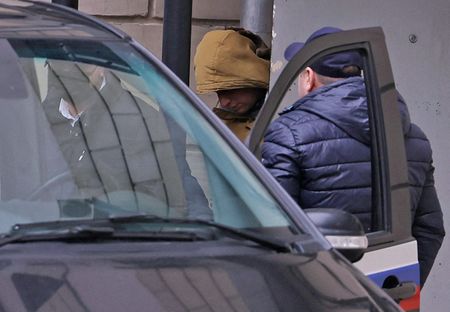(This March 30 story has been corrected to remove paragraph 10, which incorrectly referred to Daniil Berman as a lawyer representing Evan Gershkovich and gave his comments regarding court proceedings.)
By Pavel Polityuk
KYIV (Reuters) – Russia on Thursday charged an American correspondent for the Wall Street Journal with spying, in a case certain to worsen Moscow’s diplomatic feud with Washington over the war in Ukraine and likely to further isolate Russia.
The newspaper denied the allegations and demanded the immediate release of “trusted and dedicated reporter” Evan Gershkovich. The White House said the State Department was in direct contact with the Russian government over his detention and urged U.S. citizens living or travelling in Russia to depart immediately.
“These espionage charges are ridiculous. The targeting of American citizens by the Russian government is unacceptable,” White House Press Secretary Karine Jean-Pierre said at a news briefing.
Gershkovich, a 31-year-old who has worked in Russia as a journalist for six years, is the highest-profile American arrested there since basketball star Brittney Griner, who was freed in December after 10 months in jail on drugs charges.
The FSB said it arrested Gershkovich in the Urals industrial city of Yekaterinburg, “suspected of spying in the interests of the American government” by collecting information on “one of the enterprises of Russia’s military-industrial complex”, which it did not identify.
He was brought to Moscow, where a court at a closed hearing ordered him held in pre-trial detention until May 29.
Gershkovich, who has been working for the Journal for just over a year, told the court he was not guilty. His employer said the case against him, believed to be the first criminal case for espionage against a foreign journalist in post-Soviet Russia, was based on a false allegation.
Espionage under Russian law can be punishable by up to 20 years in jail.
Russian Foreign Ministry Spokeswoman Maria Zakharova said Russia would grant the U.S. consular access to Gershkovich, adding that the case against him would be made public.
“The Wall Street Journal vehemently denies the allegations from the FSB and seeks the immediate release of our trusted and dedicated reporter, Evan Gershkovich. We stand in solidarity with Evan and his family,” the newspaper said.
Deputy Foreign Minister Sergei Ryabkov said it was too early to talk of any prisoner swap with the United States, saying such deals are typically arranged only after a prisoner is convicted.
Rossiya-24 state TV ran a segment of nearly five minutes on Gershkovich’s arrest about 17 minutes into its 6 p.m. bulletin.
Its correspondent said Gershkovich’s work had an “openly propagandist character”, citing as evidence a story carrying his byline this week that was headlined “Russia’s Economy is Starting to Come Undone”.
The Russian TV report noted that the Yekaterinburg region where he was detained is a major hub of Russia’s defence industry, suggesting this was the object of his “curiosity”.
As well as escalating Moscow’s diplomatic conflict with the United States, the case could further isolate Russia by scaring off more of the few foreign journalists still working there.
Moscow has effectively outlawed all independent Russian news outlets since the start of the war but has continued to accredit some foreign reporters. Journalism has become sharply limited by laws that impose long sentences for any public criticism of the war, which Russia refers to as a “special military operation”.
KYIV ACKNOWLEDGES SOME RUSSIAN GAINS
Ukraine said on Thursday Russian forces had made some gains inside the eastern battlefield city of Bakhmut, but at a heavy price in lives lost that has blunted Moscow’s offensive as Kyiv prepares a counterstrike of its own.
The small mining city of Bakhmut has been the site of the bloodiest infantry battle in Europe since World War Two, with Russian forces seeking their first victory since mid-2022.
Ukraine has been on the defensive for nearly five months but says it is planning a counteroffensive soon.
“Enemy forces had a degree of success in their actions aimed at storming the city of Bakhmut,” the Ukrainian General Staff said in an overnight report. “Our defenders are holding the city and are repelling numerous enemy attacks.”
The report gave no details of the Russian gains. The Institute for the Study of War think tank said Russian troops and Wagner mercenaries had captured territory in the south and southwest of the city over the past two days, and Wagner had occupied a metal plant in its north this week.
Russian forces have been advancing slowly inside Bakhmut in intense street fighting. A month ago, Kyiv seemed likely to abandon the city but has since decided to stay and fight for it, hoping to break the attacking force.
Deputy defence minister Hanna Malyar said in a social media post that losses were inevitable, but “the enemy’s losses are many times greater”.
Serhiy Cherevatyi, a Ukrainian military spokesperson, told national television: “Bakhmut remains the epicenter of military activity…It’s still constantly ‘hot’ there.”
As winter has turned to spring, the pressing question is how much longer Russia can sustain its offensive, and when or if Ukraine will strike back.
Russia’s invasion has destroyed Ukrainian cities and set millions of refugees to flight. Tens of thousands of Ukrainian civilians and soldiers on both sides are believed to have died.
Moscow, which says it sent in troops because its neighbour posed a security threat, has vowed to press on fighting at least until it controls all the territory of eastern provinces, among five it claims to have annexed. Kyiv says it will fight on until all Russian troops are driven from its land.
(Writing by Peter Graff and William Maclean; Editing by Angus MacSwan and Andrew Heavens)





